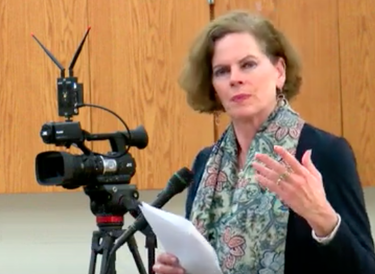‘We are billions apart’ says Fahy on budget negotiations as local school board members weigh in
GUILDERLAND — Despite the State Senate and Assembly adopting a one-house spending proposal for next year, the three-way discussions with the governor just started Tuesday, Assemblywoman Patricia Fahy told the school board here on March 21.
“We are billions apart,” she said.
Both houses are dominated by Democrats and Governor Kathy Hochul, like Fahy, is also a Democrat.
A state budget is to be adopted by April 1, leaving school districts in limbo as they prepare budgets for a May 16 public vote.
The news for education is largely good, Fahy said, noting the historic restoration of full Foundation Aid for public schools as she polled Guilderland board members on their priorities.
Guilderland has drafted a $120 million spending plan for next year, roughly $10 million more than this year’s budget, or a 9-percent increase. The estimated tax levy increase, at 2.76 percent, stays under the state-set limit.
The Guilderland proposal preserves existing programs for students as well as social and emotional support as federal funds provided during the pandemic are being used up.
The State Assembly, Fahy noted, has rejected the charter school expansion proposed by the governor and is looking at new, additional funding for pre-kindergarten programs.
She also said the Assembly is concerned about the funds set aside from Foundation Aid for high-impact tutoring proposed by the governor. “I think the intent is to give more flexibility to the districts,” said Fahy, which Guilderland leaders had called for earlier.
Fahy also said that, while she had long been concerned about the stigma for children getting free meals, and while she is a co-sponsor of the proposal for free lunches, “I’ve also heard some pushback on that on the staffing issue.”
While she supports electric school buses, Fahy said, she’s heard from districts that the cost and timeline are challenging.
The Capital District Transportation Authority, a first adopter of electric transit buses, has found they are popular “because they’re noise free, they’re emission free,” said Fahy.
Guilderland School Board member Judy Slack said she is concerned because of “the cost of redoing the garages” as well as because of the short timeframe for having electric school buses.
“I still support it,” said Fahy. “We recognize there’s a need for flexibility.”
Board President Seema Rivera said she is a “huge supporter” of free meals for all students.
Superintendent Marie Wiles said that the universal free meals the federal government paid for during the pandemic were “very popular.”
Wiles also said community input on next year’s Guilderland budget showed “lower prices for lunches was a high priority for many.”
However, during the years Guilderland offered free meals, Wiles said, staffing was an issue as was a broken supply chain.
“We often would hear from students that, by the fourth lunch period, we were out of food,” said Wiles, adding, “I think supply-chain issues are not what they were a year-and-a-half ago.”
Assistant Superintendent for Business Andrew Van Alstyne said, “I think the universal meals make sense …. I think the staffing concerns for bus drivers, for cafeteria workers … there’s still real concerns but they’re not as pressing as they were two years ago.”
Board member Katie DiPierro said she supported free meals and noted that some short-staffed districts use the Board of Cooperative Educational Services and then get BOCES aid.
“When the lieutenant governor was first promoting this idea, he focused strongly on encouraging local food sources and some diversity in meals …,” said DiPierro. “I would hope that would continue to be looked at.”
Fahy responded that “real strides” have been made in providing halal and kosher foods.
Guilderland School Board member Rebecca Butterfield told Fahy that, while funding for pre-kindergarten programs is appreciated, “I’m sure you know that finding vendors has been a struggle for many districts.”
“This is the child-care issue,” responded Fahy.
She noted that, as a long-time member of the Women’s Legislative Caucus, child care had long been “the number-one issue” although progress had been incremental.
“We thought we hit this massive home run last year, with the $7 billion allocated over multiple years … It was considered quite the victory, right?”
But, Fahy conceded, “The workers aren’t there, the vendors aren’t there … It’s a serious problem.”
So some of the $7 billion, she said, is now going to be focused on training and on helping small, home businesses to open. “That’s going to take a while to hit the pre-K level. So it’s somewhat maddening, quite frankly.”
Wiles noted that currently Guilderland is allotted $5,400 for each pre-kindergarten student, “which doesn’t begin to cover the cost for the community-based partners that we have.”
She went on, “They feel and rightfully so — and were pleased to continue to work with us — that they can actually do better just by being independent and getting self pay from parents who can afford it.”
Guilderland’s allocation from the state for universal pre-kindergarten programming has increased from $300,000 to $600,000 to $1.4 million next year. The school district doesn’t have space to house the program and can only fill the slots locally available so will be returning the unused funds.
Van Alstyne noted the state rates of funding “make it extremely difficult for community partners to address staffing shortages of wages because their slots are already functionally below market value.”
“I know we have language in there about adjusting the rate,” replied Fahy. “But I don’t have the specifics. And I won’t be given the specifics until these negotiations get underway.”
Wiles added, “We’ve had conversations at this table that statutorily it is an open lottery for those precious slots. And we would love to see some kind of weighting system to give those families most in need a better shot at getting one of the slots. Right now, it’s wide open and often, you know, those who need it most are not being selected.”
“I fully agree with you on this,” Fahy responded. “And I appreciate that that is the desire here.” But, she went on, “We get serious pushback on this.”
Fahy concluded by praising the Guilderland schools for bending over backwards during the pandemic to “keep the schools open as much as possible” and urged board members to follow up with further budget thoughts.
“We are back in marathon meetings again tomorrow,” said Fahy as she exited.
Other business
In other business at its March 21 meeting, the Guilderland School Board:
— Heard from Farnsworth Middle School Principal Michael Laster about the success of the school resource officer, Christopher Scarano, placed at Farnsworth starting Jan. 2. The pilot program is being paid for by the town until the end of the school year but the post is covered in next year’s school budget.
“Chris has a wonderful way he communicates with middle-school students,” said Laster. “Because of those quick relationships that have been developed, information has been shared both with him and other members of the administrative team, that has resulted in us supporting students who have made some poor choices in the last few weeks”;
— Heard from Guilderland High School Principal Michael Piscitelli, answering questions about safety, that “vaping is clearly an issue” — not just at Guilderland but at schools throughout the region.
Guilderland High School bathrooms are equipped with vape detectors, he said, and monitors do periodic bathroom sweeps.
“We do discipline quite a bit of students for violating, bringing a tobacco product into the school,” he said. First offenders can research and write an essay on the dangers of vaping, Piscitelli said, reducing the suspension from three days to one, which most students do.
“But then, if it happens again,” he said of vaping at school, “it’s a five-day suspension”;
— Heard from Wiles that just 12 people signed up for online focus groups to talk about the proposed school budget.
“Social-emotional learning and social-emotional wellness was big,” she said, especially for the group discussing kindergarten and first grade.
The second group, focusing on secondary education, wanted more interscholastic sports for sixth-graders and saw safety and security as “a hot topic.” Brightening classrooms by painting them was suggested as was expanding the weight room.
Both groups wanted to have small class sizes, Wiles said; and
— Had a lengthy discussion about a recommendation by the board’s communication committee to have a session for prospective school board candidates earlier than usual. Ultimately, for this year, it was decided to have the usual session for candidates who have handed in petitions on the rules of campaigning. Next year, an earlier session may be scheduled with the goal of enticing more candidates.



